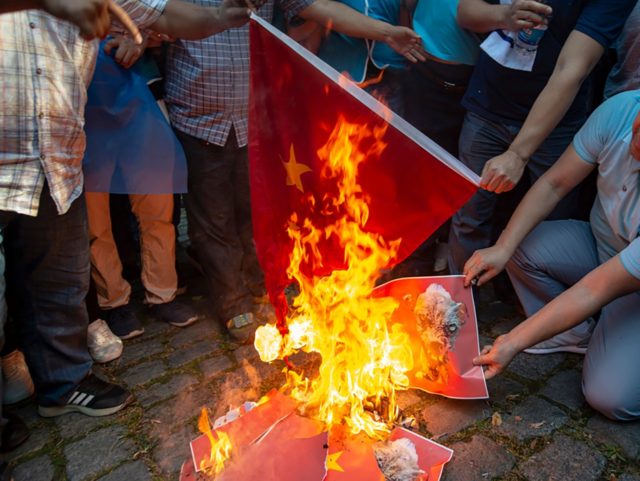A Hong Kong judge sentenced a 13-year-old girl to a year of probation, creating a permanent criminal record for her, on Friday for burning the Chinese flag during an anti-communist protest.
For adults, Hong Kong law punishes burning the Chinese flag with up to three years in prison. The Chinese Communist Party forced Hong Kong in 2017 to extend these punishments to singing the Chinese national anthem, the “March of the Volunteers,” poorly or mocking it.
Hong Kong is legally under the sovereign control of China but, at least nominally, governed outside of the scope of the Communist Party, under a policy known as “One Country, Two Systems.” Millions of Hong Kong residents have taken to the streets of their city to protest China’s growing disrespect for that policy, demanding more robust safeguards against inevitable communist attempts to overrun and subjugate the capitalist city. Desecrating the red communist flag has become an increasingly common action among the protesters in defiance of Beijing’s human rights atrocities and blatant violations of international legal norms.
The unnamed teen was arrested participating in a protest in front of the local Tuen Mun Town Hall in September and pleaded guilty to burning the Chinese flag, according to the Hong Kong Foreign Press (HKFP). She and three others reportedly took down the Chinese flag flying at the town hall and used lighters to burn it during a protest on September 21 demanding the Chinese adhere to “One Country, Two Systems” and allow Hong Kong to govern itself. Reports have not made clear if the three other individuals are also minors or what criminal punishment they may face for their actions.
The judge presiding over the case, Kelly Shui, reportedly told the court that the 13-year-old should not escape criminal punishment “just because the defendant is young” and that she must learn not to engage in “silly” behavior. Shui reportedly complimented the girl by saying she was not a “reckless” protester and had not engaged in any other acts of vandalism outside of attacking the flag, but warned that she would likely go to prison if she continued participating in anti-government protests while on probation.
The 13-year-old girl is among the over 6,000 people arrested during largely peaceful protests since the democracy movement erupted in June. According to the Hong Kong Police Force, an overwhelming number of those arrested are students by profession. Statistics released this week showed that 340 people arrested during the protests are children under 16 and the youngest person arrested was 11 years old. The outsized number of students participating reflects the fact that Hong Kong police, following the appointment of Chris Tang as the new police commissioner, began targeting college campuses for violent raids, most prominently destroying the campus of Hong Kong Polytechnic University and trapping hundreds of students inside.
Hong Kong police say only 15 percent of the thousands arrested have been charged with a crime.
The Communist Party’s propaganda outlets have increasingly targeted minors and students as the most problematic sector of the Hong Kong protest movement. Hong Kong officials have also hinted that they will punish parents and teachers if they allow or encourage children to embrace democratic norms.
“Teenagers may think it’s ‘cool’ to get out on the street and demonstrate. However, the law has some tolerance for juveniles, which has caused them to challenge the bottom line repeatedly,” the People’s Daily, the official newspaper of the Chinese Communist Party, warned in September, urging Hong Kong courts to more rigorously punish minors.
The Global Times, another communist propaganda outlet, warned even earlier, in July, that Hong Kong’s education system was engaging students too much with critical thinking and teaching them about Western-style freedoms. The report condemned the students as reckless and lazy, demanding Hong Kong instead embrace “patriotic education.”
This week, Hong Kong government officials floated the possibility of punishing teachers if their students protests or if they do not do enough to encourage students to embrace communist China. The statement from the city’s education bureau came as a response to the arrest of 11 students on Monday, citing activities in school that may have triggered support for the protest movement. Officials suggested they were investigating at least 30 teachers for inciting or supporting protests but did not specify what sort of retribution may face them.
Hong Kong officials hinted as early as September that, in extreme cases, they would consider stripping children from their parents if the minors were exposed to positive information about the protest movement. Police arrested three children that month, two boys and a girl aged 13 to 15, for being near the vicinity of a free screening of Winter on Fire, a documentary about pro-democracy protests in Ukraine. In response to the arrests, a Hong Kong court asserted that “their parents had failed to keep them in check” and the government should intervene to “protect” the children from their parents.
Protesters have participated in rallies and marches in Hong Kong since June demanding China stop attempting to encroach on the rights Beijing agreed to protect when the city left British control in 1997. They have made five demands of their government. The Hong Kong government ceded to the first: the full withdrawal of a proposed bill that would have allowed China to extradite people out of Hong Kong into the communist prison system. Chief Executive Carrie Lam rejected the other four, however: freedom for political prisoners, an independent investigation into police brutality, an end to calling the protests riots, and the right to directly elect the city’s lawmakers.
Follow Frances Martel on Facebook and Twitter.

COMMENTS
Please let us know if you're having issues with commenting.